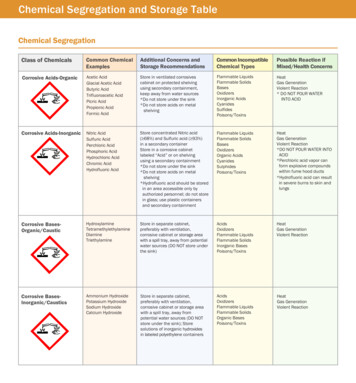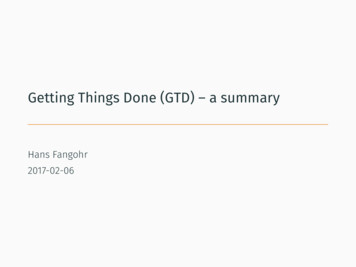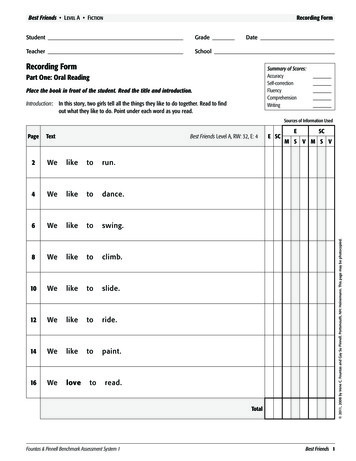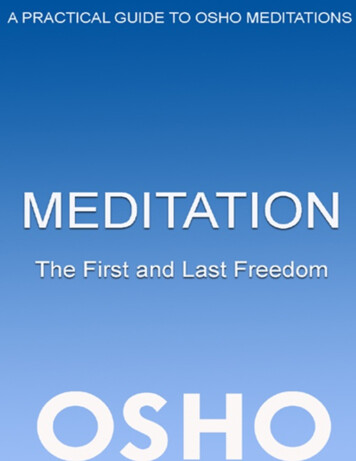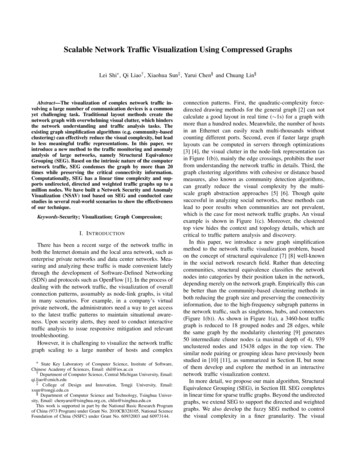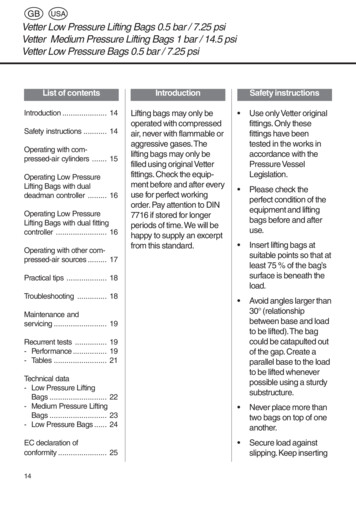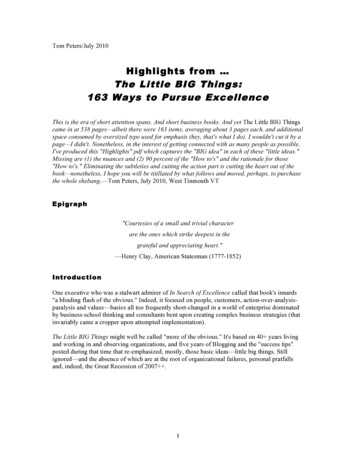
Transcription
Tom Peters/July 2010Highlights from The Little BIG Things:163 Ways to Pursue ExcellenceThis is the era of short attention spans. And short business books. And yet The Little BIG Thingscame in at 538 pages—albeit there were 163 items, averaging about 3 pages each, and additionalspace consumed by oversized type used for emphasis (hey, that's what I do). I wouldn't cut it by apage—I didn't. Nonetheless, in the interest of getting connected with as many people as possible,I've produced this "Highlights" pdf which captures the "BIG idea" in each of these "little ideas."Missing are (1) the nuances and (2) 90 percent of the "How to's" and the rationale for those"How to's." Eliminating the subtleties and cutting the action part is cutting the heart out of thebook—nonetheless, I hope you will be titillated by what follows and moved, perhaps, to purchasethe whole shebang.—Tom Peters, July 2010, West Tinmouth VTEpigraph"Courtesies of a small and trivial characterare the ones which strike deepest in thegrateful and appreciating heart."—Henry Clay, American Statesman (1777-1852)IntroductionOne executive who was a stalwart admirer of In Search of Excellence called that book's innards"a blinding flash of the obvious." Indeed, it focused on people, customers, action-over-analysisparalysis and values—basics all too frequently short-changed in a world of enterprise dominatedby business-school thinking and consultants bent upon creating complex business strategies (thatinvariably came a cropper upon attempted implementation).The Little BIG Things might well be called "more of the obvious." It's based on 40 years livingand working in and observing organizations, and five years of Blogging and the "success tips"posted during that time that re-emphasized, mostly, those basic ideas—little big things. Stillignored—and the absence of which are at the root of organizational failures, personal pratfallsand, indeed, the Great Recession of 2007 .1
"LITTLE"1. It's All About the Restrooms! A sparkling restroom with family photos in a smallrestaurant in Gill MA shouts "We care." (Hey, I made this the #1 item in my book for a goodreason!) To enshrine this attitude in the organization I suggest in part, tongue only half in cheek, ajob titled, perhaps: "Little Things Lunatic," "Tiny Touch Maniac-in-Chief," or "Wizard-of-Wee."The devil—and a culture that demands EXCELLENCE—really is in the details!2. "Small Stuff" Matters. A Lot! For you or me, the recorded phone message literally sets thestage. A vast array of "small stuff" like this adds up to strategic distinction—or, clearly, not.Moreover, working on "the small stuff" is doable, right now, with no muss or fuss or politicalinfighting or position of formal power.3. Flower Power! An unlimited flowers budget, regardless of the economic context, may yieldthe highest "ROI"/Return On Investment imaginable. Flowers transform spaces and attitudes!My advice: Go berserk .4. Master the Fine Art of . Nudgery!all around us: Huge multipliers emanating from "nudges" lie in waitWal*Mart increases shopping cart size—and sales of big items (like microwave ovens)go up . 50 percent!Use a round table instead of a square table—and the percentage of people contributing toa conversation leaps up!If the serving plate is more than 6.5 feet from the dining room table, the number of"seconds" goes down 63 percent, compared with leaving the serving plates on the table.Want to make a program "strategic"? Put it at the top of every agenda. Make asking about"it" your first question in every conversation. Put the person in charge in an office next tothe Big Boss.Frito-Lay adds new bag sizes, suffers no cannibalization of current offerings, and ends upcreating totally new (and enormous) markets—racking up, eventually, billions inrevenues.Get rid of wastebaskets under desks—recycling leaps up.Simply put hand-sanitizer dispensers all over a dorm, with no signs asking students to usethem—and the number of sick days and missed classes per student falls 20 percent.(University of Colorado/Boulder)."Broken windows": Clean up trash, fix broken windows, stop miscreants for trivialoffenses such as loitering or open alcohol containers—and increase neighborhood safetydramatically. (Using this approach, Chief Bratton and Mayor Giuliani had spectacularsuccess on a pretty big stage—New York City.)What's called for is a belief that such multipliers abound—and a determination to become a"professional nudgist." "Get it right the first time"? Rarely. Relentlessly experiment your way tofrequent success? That's the ticket.2
EXCELLEN CE5. If Not Excellence, What? If Not Excellence Now, When?"Strive for excellence. Ignore success."— Professional driver Bill Young"Excellence can be obtained if you:" . care more than others think is wise;" . risk more than others think is safe;" . dream more than others think is practical;" . expect more than others think is possible."—K. Sriram @ tompeters.com:"A minute. You 'achieve' Excellence by promising yourself right now that you'll never againknowingly do anything that's not Excellent—regardless of any pressure to do otherwise by anyboss or situation." —Tom Watson, IBM, approximate words, on how long it takes to achieveExcellence6. Whither Excellence? Or: Asleep at the Wheel. One of our best business analysts, James B.Stewart, offered this "simple" commentary on the staggering decline of General Motors (in theJune 3, 2009, Wall Street Journal): "It has been long in coming, this slow death of what was oncethe greatest and biggest corporation in the world. The myriad causes of its demise have beenthoroughly chronicled, but to my mind one stands out: The custodians of GM simply gave uptrying to build the best cars in the world. To accommodate a host of competing interests, fromshareholders to bondholders to labor, they repeatedly compromised on excellence. Oncesacrificed, that reputation has proved impossible to recapture. . Can anyone say GM builds thebest cars in any category?"And you?Has the word "EXCELLENCE" per se been used as a basis for evaluating your actions? Couldyou personally call the outcome of each meeting or the nature of the milestone/s achieved"EXCELLENT"?Key idea: The "Excellence Standard" is not about Grand Outcomes. In Zen-like terms, all wehave is today. If the day's work cannot be assessed as Excellent, then the oceanic overall goal ofExcellence has not been advanced. Period.7. "Quality": You'll Know It When You See It. Six Sigma is "good stuff"—great stuff. Nodoubt whatsoever about it. From a more encompassing standpoint, the quality "movement" addedbillions upon billions of dollars to America's bottom line.Only . Whoops! Better car quality—which we surely got from GM and Ford—was supposed to have saved the U.S. automotiveindustry from the Japanese automotive onslaught.Am I suggesting you scrap quality programs? Hardly! But "quality," as it's commonlyunderstood, is Six Sigma-ish and readily measured. But there's more to it. Much more. I believethat "quality," like "Excellence," is one of those . "I'll know it when I see it" . words. Soquantify quality all you want (please do!) . but don't forget that quality is equally—nay,primarily—determined by something that is elusive, mysterious, indefinable. And . in the eye ofthe beholder.3
Bottom line: Give the "soft side" of quality the respect it deserves!8. Excellence Is .Excellence is the best defense.Excellence is the best offense.Excellence is the answer in good times.Excellence is the answer in tough times.(Excellence is the answer in tough times.)Excellence is about the big things.Excellence is about the little things.Excellence is a relationship.Excellence is a philosophy.Excellence is an aspiration.Excellence is immoderate.Excellence is a pragmatic standard.Excellence is execution.Excellence is selfish.Excellence is selfless.Excellence is what keeps you awake.Excellence is what lets you sleep well.Excellence is a moving target.Excellence is that which . knows no bounds.EXCELLENCE. Always.If not EXCELLENCE, what?If not EXCELLENCE now, when?EXCELLENCE is not an "aspiration."EXCELLENCE is the next five minutes.SPECIAL SECTION: G uru G affesThe "gurus"—like me—tend to focus almost exclusively on big companies, public companies,sexy industries, superstar CEOs. Yet "what makes the world go 'round" are small privateenterprises, doing mostly unsexy stuff. What can we do to assist them? There are another 25 or so"guru gaffes" explored in this special section of the book; the first five are included here:Guru Focus (GF): Big companies and attendant first-order, industry-redefining strategic issues.Real World (RW): Most of us, still, in 2010 don't work for Big Companies; we labor in "SMEs,"Small and Medium-sized Enterprises. (Or the likes of government agencies.) And if we arein a big company or agency, most of our focus is the 17-person department in which welaborGF: Public corporations.RW: Most of us work in privately owned companies. (Or in those government agencies.)4
GF: Cool industries.RW: Most of us aren't in "Cool" industries, we do pretty ordinary stuff—like my pal, LarryJanesky, who makes a buck, and then another ( 60 million, actually), creating "drybasements," that are free of toxic mold, and can be used as a spare room or for a playroomor storing anything and everything.GF: "Excellence" is reserved for GE and GE and GE (maybe Google and Apple, too).RW: "Excellence," bar none, is the fabulous, friendly, informative, instantly responsive pharmacynext door that takes on docs and insurance companies with vigor and usually victory.(Gary Drugs on Charles Street in Boston, for me.)Etc.CRISIS9. That Which Goeth Up and Up and Up Doth Not Goeth More Up and More Up and MoreUp Forever and Ever and Ever. The Great Recession was the byproduct of many factors—collectively the failure of commonsense to counter the bizarre projections of supposedly hypersmart people. Will it happen again? Of course, just in another form. If we could realize cyclicalityis an immutable fact, regardless of measures to prevent it, we'd be a lot better off.If you/we want answers, we'd do no better than to ingest Vanguard Mutual Fund Group founderJohn Bogle's amazing book Enough. Rather than try to provide a clever summary of the book,I'll let the chapter titles do the work for me. Here's a sample:"Too Much Cost, Not Enough Value""Too Much Speculation, Not Enough Investment""Too Much Complexity, Not Enough Simplicity""Too Much Counting, Not Enough Trust""Too Much Business Conduct, Not Enough Professional Conduct""Too Much Salesmanship, Not Enough Stewardship""Too Much Focus on Things, Not Enough Focus on Commitment""Too Many Twenty-first Century Values, Not Enough Eighteenth-Century Values""Too Much 'Success,' Not Enough Character"As to the overarching theme of the book, Mr. Bogle begins with this vignette: "At a party givenby a billionaire on Shelter Island, Kurt Vonnegut informs his pal, Joseph Heller, that their host, ahedge fund manager, had made more money in a single day than Heller had earned from hiswildly popular novel Catch-22 over its whole history. Heller responds, 'Yes, but I have somethinghe will never have .enough.'"Enough said.10. Good Things (Especially in Bad Times?) Come in Threes. As the crisis unfolded, thetroika of Paulson-Bernanke and Geithner worked together in unconventional ways (friction-freecommunication, try something quick and if it fails reverse course quickly) which hold importantlessons for all crises:5
(1) Concoct an authoritarian control group that numbers three. I am anti-authoritarian to the core,but there are rare exceptions to that rule.(2) "Over"-communicate. (!!!)(3) "Over"-communicate. (!!!)(4) Drop all pretense of formality.(5) Park egos at the door. (Boot egoists from the inner circle if they don't shape up veryquickly.)(6) Ensure that the group is diverse.(7) Ensure that each member of the group has a Towering Competence—and is perceivedas having such.(8) Each member must have widespread credibility.(9) Foster a predilection for . rapid trial and error. First, that creates the perception that"they aren't dilly-dallyin'"—motion matters. Second, the cure is anything but sure—so one must get moving if for no other reason than to see what happens when thesystem is perturbed. Third, there must be a willingness to admit error and stop a failedexperiment ASAP—rather than holding on as a way of not admitting the experimentwas a bust.(10) Also "over"-communicate beyond the group.11. Get China on Your Mind! Get India on Your Mind! Regardless of your rank and serialnumber, you should become a student of China and India. Both countries continue to grow at aremarkable pace—and together their population is about two-and-a-half billion. I'm not askingfor the moon, but I am saying you'd best move up the learning curve to some extent.O PPO RTUN ITY12. Tough Times? Matchless Opportunity! The conventional wisdom is that tough times area great opportunity to crowd out competitors suffering more than you are. I believe that toughtimes are mostly the ultimate test of character. Behaving decently when the yogurt hits the fanwill be long remembered after the worst has passed.Instead of leaping to "grab our staggering competitor's customers," maybe we should react withgreat compassion toward that competitor—not by paying his bills, but by making it clear that wehave neither the intention nor the desire to rip his customers out from under him (or her).Instead of "think positive," try . "think thoughtful." Mindless optimism is just that—mindless.We must deal realistically with the crisis—and, arguably, exhibit a level of decency that knowsno bounds. Such behavior is neither "positive" nor "negative." It is what it is: decent. Sneaky factis, such a display of character is probably damn good for business when the comeback occurs—people have very long memories of thoughtful behavior!13. Boring Is Beautiful! (Or at Least It Can Be.) Jim Penman started out mowing lawns.Now the Aussie-based company he started has over 2,500 franchisees doing "stuff" that busypeople don'r have time to do—from walking dogs to installing security doors to cleaning carpets.Basement Systems, Inc., meanwhile, is a fast-growing, 60-million-plus Connecticut-basedbusiness. Larry Janesky runs it. He'll dry out your basement. (See his, yes, best-selling book DryBasement Science.) The basement thus becomes a stellar storage area, or a non-damp, non-moldy,non-illness-inducing family room, or a spare bedroom—whatever.6
Message: For would-be entrepreneurs, there's more to life than Biotech and Internet start-ups and"boutique" financial planning businesses.14. "Old" Rules. (Yes, Even in the "Age of the Internet.")"People turning 50 today have half their adult lives ahead of them."—Bill Novelli, 50 : Ignitinga Revolution to Reinvent AmericaAmericans on average own 13 cars in a lifetime; 7 are bought after the age of 50.(How about deriving a "code" to remind you of "all this": 13/7/50.)People age . 55 or older . are . more active . in . online finance, shopping, and entertainment. than those under 55 (Forrester Research).The "boomer-geezer" market is exploding around the world—and is ridiculously underserved.What an opportunity for the next 25 or so years—in fact, market opportunity #1. Mantra, by anold guy (me):We are the Aussies & Kiwis & Americans & Canadians. We are the Western Europeans &Japanese. We are the fastest-growing, the biggest, the wealthiest, the boldest, the most (yes)ambitious, the most experimental & exploratory, the most (self-)indulgent, the most difficult &demanding, the most service- & experience-obsessed, the most vigorous, the most healthconscious, the most female, the most profoundly important commercial market in the history ofthe world—and we will be the Center of your Universe for the next twenty-five years.We have arrived!15. Build Green Now. (No Excuses!) Here is the impact of our buildings on energyconsumption, CO2 emissions, and the like (from Green Building A to Z, by Jerry Yudelson):Share of total energy used by buildings: 39%Share of electricity used by buildings: 68%Share of carbon-dioxide emissions caused by buildings: 40%Share of raw materials used in buildings: 30%In terms of energy efficiency/independence and minimized climatic damage, curbing the likes ofSUV use is of course controversial. "Green building" should not/need not be! The opportunity ishuge, and the payback period is relatively short. A host of approaches have been proven. Theprocess is motivating. And you can get started more or less tomorrow in old buildings as well asnew.16. Bottom Line in Bad Times: Obsess Over the Top Line. Containing costs in tough times isimperative—especially given our relative sloppiness when markets were soaring. But assumingthat cost-control-r-us is a bad mistake. Working to improve the distinction of our products andservices is more important than ever. In the toughest of times, there's a lot of business left—andwe want an "unfair" share of it, right?7
RESILIENCE17. Swan Dive: A Guide to Getting On with Getting On. Nassim Nicholas Taleb's The BlackSwan was an extraordinarily well-timed book. The black swan is an unpredictable event. If it'sunpredictable, what, then, if anything, can we do about it? One answer is create "resiliententerprises" staffed with people in all positions who have exhibited a disposition for resilience.While we can hardly afford "redundant everything," policies and processes and projects andtraining aimed at increased resilience are very much possible—e.g., Microsoft helped employeesequip their home offices when it appeared the swine flu might restrict the # of folks working instandard offices for a lengthy period.18. Lifetime Employment Is Dead. Your Career Is Not. Electricians and plumbers andcarpenters and the couple running the 17-table Italian restaurant on Main Street, your "ordinary"neighbors and the majority of us, have never in their wildest dreams imagined "lifetimeemployment." Well, neither should you or I as time marches/sprints on. The best/only defense is(1) work of great distinction and (2) networks that are both wide and deep. The ability to "thinklike an entrepreneur" is in fact widely distributed—the new immigrant single-mom with nocollege education, working two or so jobs, "gets it"—how about you?19. "Failure"—Celebrate It! Whoever tries the most stuff wins. (All you need to know inlife.) Hence, it is axiomatic that whoever fails the most wins—truly. Hence failures must not justbe "tolerated;" they must, in effect, be encouraged—and, yes, celebrated.Wisdom:"Fail. Forward. Fast."—high-tech exec, Valley Forge PA"Fail. Fail again. Fail better."—Samuel Beckett, Nobel Laureate, literature"Success is going from failure to failure without losing enthusiasm."—Winston Churchill"Whoever Makes the Most Mistakes Wins"—book title, Richard Farson and Ralph Keyes"If people tell me they skied all day and never fell down, I tell them to try a differentmountain."—Michael Bloomberg20. The World's Worst Advice (Please Ignore It) "Relentless" may be my favorite word in"success literature." Hence, "Know when to hold 'em and know when to fold 'em" is 99% wrongheaded. Most of us won't end up in the history books, but those who do—every bloody one ofthem—did not know when to fold 'em!Bottom line: "There's a time to hold 'em and a time to keep on holdin' 'em—if you really reallyreally care."8
SPECIAL SECTION: The Recession46: Forty -Six "Secrets" and"Strategies" for Dealing w ith the Severe Dow nturn of 2007 Developed for a seminar in Finland, these "secrets" are in fact anything but:(1) You come to work earlier.(2) You leave work later.(3) You work harder.(4) You may well work for less; and, if so, you adapt to the untoward circumstances witha smile—even if it kills you inside.(5) You volunteer to do more.(6) You dig deep, deeper, deepest—and always bring a good attitude to work.(7) You fake it if your good attitude flags.(8) You literally practice your "stage face" in the mirror each morning, and in the loomid-morning.(9) You give new meaning to the idea and intensive practice of "visible management."(10) You take better than usual care of yourself and encourage others to do the same—physical well-being significantly impacts mental well-being and response to stress.(11) You shrug off shit that flows downhill in your direction—buy a shovel or a "preworn" raincoat on eBay.(12) You try to forget about the "good old days"—nostalgia is self-destructive. (Andboring.)(13) You buck yourself up with the thought that "this too shall pass," but then remindyourself that it might not pass anytime soon; and so you rededicate yourself tomaking the absolute best of what you have now—character is determined, virtuallyin full, by one's reaction to adverse circumstances.(14) You work the phones and then work the phones some more—and stay in touch with,and on the mind of, positively everyone.(15) You frequently invent breaks from routine, including "weird" ones—"change-ups"prevent wallowing in despair and bring a fresh perspective.(16) You eschew all forms of personal excess.(17) You simplify.(18) You sweat the details as never before.(19) You sweat the details as never before.(20) You sweat the details as never before.(21) You raise to the sky and maintain—at all costs—the Standards of Excellence bywhich you unfailingly and unflinchingly evaluate your own performance.(22) You are maniacal when it comes to responding to even the slightest screw-up.(23) You find ways to be around young people and to keep young people around—theyare less likely to be members of the "sky is falling" school. (Naïveté can be ablessing.)(24) You learn new tricks of your trade.(25) You pass old tricks of the trade on to others—mentoring matters now more thanever.(26) You invest heavily in your skills.(27) You remind yourself, daily, that this is not just something to be "gotten through"—itis the Final Exam of Competence, of Character, and, even if you're not a boss, ofLeadership. (People often make great leaps in a short period during difficult times.)(28) You network like a demon.9
(29) You network like a demon inside the company—get to know more of the folks who"do the real work," and who can be your most dependable allies when it comes togetting things done seamlessly and fast.(30) You network like a demon outside the company—get to know more of the folks"down the line," who "do the real work" in vendor-customer outfits. (They canbecome, and will become, your most avid allies and champions.)(31) You offer thanks to others by the truckload if good things happen—and take the heatif bad things happen.(32) You behave kindly, but you don't sugarcoat or hide the truth—humans arestartlingly resilient, and rumors are the real spirit-killers.(33) You treat small successes as if they were World Cup victories—and celebrate andcommend people accordingly.(34) You shrug off the losses (ignoring what's going on in your tummy), and get back onthe horse and immediately try again.(35) You avoid negative people to the extent you can—pollution kills.(36) You read the riot act to the gloom-sprayers, once avoiding them becomesimpossible. (Gloom is the ultimate "weapon of mass destruction" in tough times.)(37) You give new meaning to the word "thoughtful."(38) You don't put limits on the budget for flowers—"bright and colorful" worksmarvels.(39) You redouble and re-triple your efforts to "walk in your customer's shoes."(Especially if the shoes smell.)(40) You mind your manners—and accept others' lack of manners in the face of theirstrains.(41) You are kind to all mankind.(42) You keep your shoes shined.(43) You leave the blame game at the office door.(44) You call out, in no uncertain terms, those who continue to play the "office politics"game.(45) You become a paragon of personal accountability.(46) And then you pray.10
SELF21. You Are Your Product—Develop It."The last of human freedoms—the ability to choose one's attitude in a given set ofcircumstances." —Viktor Frankl, psychologist and Holocaust survivor, on concentration camps"You must be the change you wish to see in the world."—GandhiAll you have for sure is your attitude. So: Work on it, including, yes, your smile (thesmile/warmth was a huge part of Nelson Mandela's success); and shape it. Why:Energy begets energy.Wow begets Wow.Optimism begets Optimism.Honesty begets honesty.Caring begets caring.Listening begets engagement.Message: LBUAA/Leadership By Unilateral Attitude Adjustment.22. Job One: Amuse Yourself! You must stay fresh and energized. (If you want to transmitfreshness and energy to others—see immediately above.) Hence you must—and most don't in theheat of day-to-day affairs—somehow or other find the time/make the time to re-tool yourself. It'sone of my hardest personal tasks—but, perhaps, my most important task.23. Fitness Power Staying Power. I'm not playing "health nut" here. I'm playing "attitudenut." Fact is, if you're fit you feel better about yourself which adds to your resilience (especiallyimportant in tough times) and is indirectly transmitted to others.24. Mental Gymnastics, Urgency of. Unless your mind is jerked around, stood upside down,shocked, etc.—you are not growing. If you can't say, a couple of times a week, "I had my mindtwisted like a pretzel today," you are sliding down a slippery slope to stale thinking and stalenessin general. (Both mind & body must be fit and stretched!)25. You Are Your Story! So Work on It!"A key—perhaps the key—to leadership is the effective communication of a story."—HowardGardner, Leading Minds: An Anatomy of LeadershipHe/she who has the best/most compelling/most resonant story wins:In life!In business!In front of the jury!In front of the congregation!Few things are more important to moving mountains (or even anthills) than storytelling. Youmust be an emergent and compelling story—and you must mainly communicate through storiesto kindle change.11
Your schedule—TODAY—is a short story with a beginning, narrative, end, and memory thatlingers on. Your current project is . an unfolding story about making something better, excitingusers, etc. Your organization's raison d'être, and hence its effectiveness, is a story.FYI: Developing effective storytelling skills is hard work! (But worth it X10.)26. Develop Your R.POV8—ASAP! Seth Godin says: "If you can't describe your position ineight words or less, you don't have a position." My abbreviation is R.POV8, for RemarkablePoint Of View in 8 words or less. In my own case, I beat Seth's requirement by 7! Took us ayear to "get it right" for the Tom Peters organization—we ended up with a RED (Pantone #032)Exclamation Mark. Fits my last 30 years perfectly—thanks, Seth!O THERS27. Kindness Is Free!"Three things in human life are important. The first is to be kind. The second is to be kind. Andthe third is to be kind."—Henry JamesAn extensive 225-hospital, 140-thousand patient survey by Press Ganey identified 15 factorswhich shaped patient satisfaction. The startling results: "Not a single one of the top 15 sources ofpatient satisfaction had to do with the patient's health outcome. All 15, in effect, were related tothe quality of the patient's interactions with hospital staff—and employee satisfaction among staffmembers." The key, at an even deeper level, according to a patient-centrism experts at top-rankedGriffith Hospital:"There is a misconception that supportive interactions require more staff or more time and aretherefore more costly. Although labor costs are a substantial part of any hospital budget, theinteractions themselves add nothing to the budget."Kindness is free."Listening to patients or answering their questions costs nothing. It could be argued that negativeinteractions—alienating patients, being unresponsive to their needs, or limiting their sense ofcontrol—can be very costly. Angry, frustrated, or frightened patients may be combative,withdrawn, and less cooperative—requiring far more time than it would have taken to interactwith them initially in a positive way."This has become a centerpiece of my work. In the commercial sphere I encompass it with anequation:K R P.Kindness Repeat business Profit.That is, among other things, kindness is the ultimate "hard" variable affecting the bottom line.12
28. Civil! Civil! Civil!"For many years literature was my life . One day, while lecturing on the Divine Comedy, Ilooked at my students and realized that I wanted them to be kind human beings more than Iwanted them to know about Dante. I told them that if they knew everything about Dante and thenwent out and treated an elderly lady on the bus unkindly, I'd feel that I had failed as a teacher."—P.M. Forni, Choosing Civility: The Twenty-five Rules of Considerate ConductIt's a variation on the theme above: civil behavior. I was influenced by a description of a bookcalled Rules of Civility & Decent Behavior in Company and Conversation that GeorgeWashington had produced from a list of 110 items encompassing civil behavior originally createdby French Jesuits in 1595.(E.g.: #1 - Every action done in company ought to be done with somesign of respect to those that are present.) Washington's proper & gracious behavior was a keysuccess factor throughout his life. Again, to me, "civil" strikes me as a stunning profitenhancement tool. (Among other things.)29. Listen to Ann—and "Act Accordingly." The late Texas governor Ann Richards tells usthat despite ire, or even fury, at a service mixup, you must remember that the frontline person youare dealing with is the only person on earth who can help you. Act accordingly—i.e. withreverence! It's great advice! It works!30. "Being There" (Or: How I Learned First Principles from My Grandfather's Last Rites.)"You can make more friends in two months by becom
The Little BIG Things: 163 Ways to Pursue Excellence This is the era of short attention spans. And short business books. And yet The Little BIG Things came in at 538 pages—albeit there were 163 items, averaging about 3 pages each, and additional space consumed by oversized type used for


